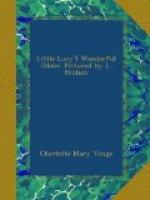“To Petropawlowsky, to change these skins for coffee, and rice, and rice,” answered the boy.
“What skins are they?” asked Lucy.
“Bears’—big brown bears that father killed in a cave—and wolves’ and those of the little ermine and sable that we trap. We get much, much for the white ermine and his black tail. Father’s coming in another sledge with, oh! such a big pile. Don’t you hear his dogs yelp? We’ll win the race yet! Ugh! hoo! hoo! ho-o-o-o!—On! on! lazy ones, on, I say! don’t let the old dogs catch the young ones!”
Crack, crack, went the whip; the dogs yelped with eagerness,—they don’t bark, those Northern dogs; the little Kamschatkadale bawled louder and louder, and never saw when Lucy rolled off behind, and was left in the middle of a huge snowdrift, while he flew on with his load.
Here were his father’s dogs overtaking her; and then some one was picking her up. No, it was Don! and here was Mrs. Bunker exclaiming, “Well, if here is not Miss Lucy asleep on Master’s old bearskin!”
CHAPTER X. THE TURK.
“What a beautiful long necklace, Mrs. Bunker! May I have it for Lonicera?”
“You may play with it while you are here, Missie, if you’ll take care not to break the string, but it is too curious for you to take home and lose. It is what they call a Turkish rosary; they say it is made of rose-leaves reduced to a paste and squeezed ever so hard together, and that the poor ladies that are shut up in the harems have little or nothing to do but to run them through their fingers.”
“It has a very nice smell,” said Lucy, examining the dark brown beads, which hung loosely on their string, and letting them fall one by one through her hands, till of course that happened which she was hoping for: she woke on a long, low sofa, in the midst of a room all carpet and cushions, in bright colors and gorgeous patterns, curling about with no particular meaning; and with a window of rich brass lattice-work.




